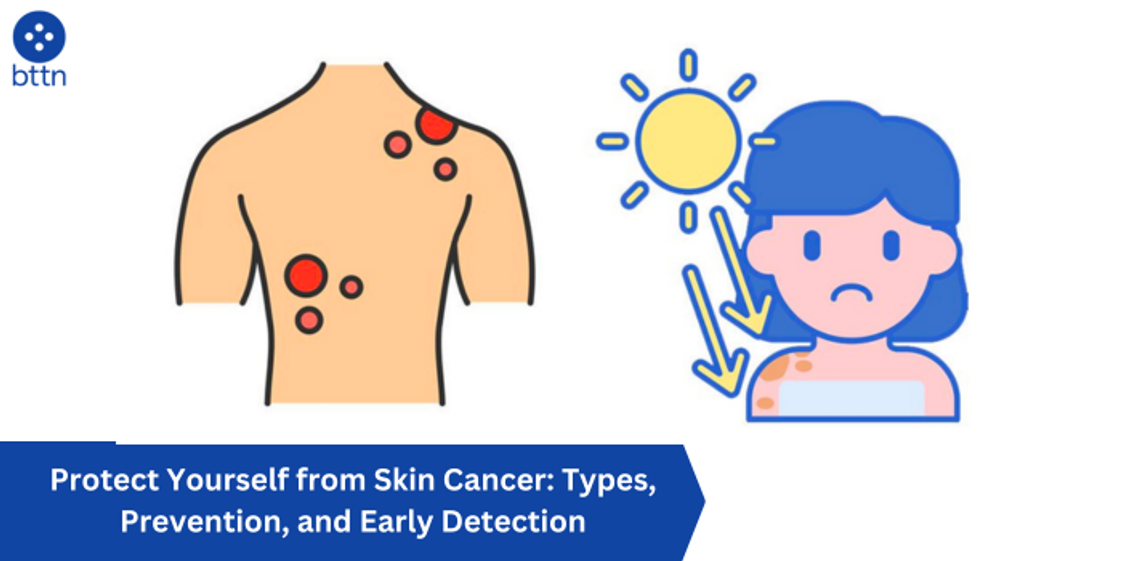
Protect Yourself from Skin Cancer: Types, Prevention, and Early Detection
Posted by Pankaj Dhiman on Sep 6th 2024
Skin cancer is the most common type of cancer in the United States, affecting millions of people each year. It's crucial to understand its causes, various forms, and how to prevent and detect it early. This comprehensive guide will equip you with the knowledge and tools to protect yourself from this potentially life-threatening disease.
How Does Skin Cancer Occur?
Skin cancer arises when the DNA in skin cells gets damaged, causing them to grow uncontrollably. The primary culprit behind this damage is ultraviolet (UV) radiation, primarily from the sun. This radiation comes in two forms:
- UVB rays: These rays cause sunburns and contribute to the development of basal cell carcinoma (BCC) and squamous cell carcinoma (SCC), the most common types of skin cancer.
- UVA rays: These rays penetrate deeper into the skin, contributing to premature aging and increasing the risk of melanoma, the most aggressive form of skin cancer.
Must Read: 12 Best Selling Wound Care Products in US
Types of Skin Cancer and Their Symptoms:
- Basal Cell Carcinoma (BCC): This is the most prevalent form of skin cancer, often appearing as:
- A pearly or waxy bump with a translucent or pink center.
- A flat, scaly patch with a raised border.
- A sore that bleeds easily and doesn't heal.
- Squamous Cell Carcinoma (SCC): This type of skin cancer typically manifests as:
- A rough, scaly patch that may bleed and crust over.
- A firm, red bump that grows quickly.
- Melanoma: This aggressive form of skin cancer can appear in various ways, including:
- An irregular mole with a mixture of colors (brown, black, tan, red, blue, or white).
- A mole with an uneven border.
- A mole that is larger than a pencil eraser (6mm).
- A mole that changes in size, shape, or color.
Must Read: Bone Cancer: What You Need to Know
Skin Cancer Risk Factors:
Several factors can increase your risk of developing skin cancer, including:
- Fair skin: Individuals with less melanin (skin pigment) are more susceptible.
- A history of sunburns: Sunburns, especially during childhood, can significantly increase your risk.
- Family history of skin cancer: Having family members with skin cancer makes you more predisposed.
- Excessive sun exposure: Spending a lot of time outdoors without proper protection is a major risk factor.
- Use of tanning beds: Tanning beds emit UV radiation and significantly increase your risk.
- Weakened immune system: Individuals with compromised immune systems are at higher risk.
- Certain medical conditions: Certain medications and medical conditions can heighten the risk.
Must Read: Iron Pills: Side Effects and Benefits of Supplements for Optimal Health
Skin Cancer Prevention:
The good news is that skin cancer is highly preventable with a few key strategies:
Sun Protection:
- Seek shade: Whenever possible, seek shade, especially during peak sun hours (10 am to 4 pm).
- Wear sun-protective clothing: Opt for tightly woven fabrics that cover your arms, legs, and neck. Consider sun-protective clothing with a UPF (Ultraviolet Protection Factor) rating of 50+.
- Wear a wide-brimmed hat: This helps shield your face, ears, and neck from the sun's rays.
- Wear UV-protective sunglasses: Look for sunglasses that block both UVA and UVB rays.
- Apply sunscreen liberally and regularly: Choose a broad-spectrum sunscreen with an SPF of 30 or higher. Apply generously to all exposed skin 15 minutes before going outdoors and reapply every two hours, or more often if swimming or sweating.
Must Read: Purchase Affordable Face Shields in Bulk
Lifestyle Adjustments:
- Limit your time in the sun, especially during peak sun hours.
- Avoid tanning beds and sunlamps.
- Practice self-exams regularly (monthly) to monitor your skin for changes.
- Schedule regular skin cancer screenings with your doctor.
Diet and Supplements:
While no specific diet or supplement can guarantee skin cancer prevention, maintaining a healthy lifestyle with a balanced diet rich in fruits, vegetables, and whole grains can contribute to overall health and well-being, potentially reducing your risk of various cancers, including skin cancer. It's crucial to consult with your doctor before taking any supplements to ensure they are safe and appropriate for you.
Must Read: Top Trends in Wholesale Medical Supplies for Seattle in 2024
Early Detection and Intervention:
Early detection is crucial for successful skin cancer treatment. Performing regular self-exams and scheduling regular skin checks with your doctor are essential. During self-exams, look for any new or changing moles, unusual patches of skin, or any suspicious lesions. If you notice anything concerning, consult your doctor immediately. Early detection and treatment significantly improve the chances of successful treatment and a positive prognosis.
Prevention
Prevention is always better than cure when it comes to skin cancer. By taking proactive steps to protect your skin and practicing sun safety habits, you can significantly reduce your risk of developing this potentially life-threatening condition.
Shop Now - IV Supplies
FAQs
Q: Can skin cancer affect people of all ages?
A: While the risk of skin cancer increases with age, it can affect individuals of all ages, including children and young adults.
Q: Are sunscreen products effective in preventing skin cancer?
A: Yes, sunscreen with a high SPF (Sun Protection Factor) can help protect your skin from UV radiation when used correctly in combination with other sun safety measures.
Q: Is it necessary to wear sunscreen on cloudy days?
A: Yes, UV radiation can penetrate through clouds, so it's important to wear sunscreen even on cloudy days.
In conclusion, skin cancer is a serious health concern that requires proactive measures to prevent and detect early. By understanding the risk factors, adopting sun safety practices, and prioritizing regular skin checks, you can safeguard your skin health and reduce the likelihood of developing skin cancer. Remember, protecting your skin today can lead to a healthier tomorrow.
